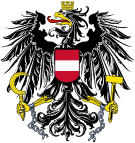
The Austrian People's Party is a Christian-democratic and liberal-conservative political party in Austria.

The Alliance for the Future of Austria is a right-wing populist, national conservative political party in Austria.
Knittelfeld Putsch refers to a conference of the Freedom Party of Austria (FPÖ) which took place on 7 September 2002 in the small Austrian town of Knittelfeld, Styria, called due to political differences within the party leadership. The events resulted in early federal elections in the same year.

The 2005 Styrian state election was held on 2 October 2005 to elect the members of the Landtag of Styria.

Legislative elections were held in Austria on 28 September 2008 to elect the 24th National Council, the lower house of Austria's bicameral parliament. The snap election was called after Austrian People's Party (ÖVP) withdrew from the ruling grand coalition with the Social Democratic Party of Austria (SPÖ) in July. Due to dissatisfaction with the governing parties, the opposition and minor parties were expected to make significant gains. Opinion polling indicated that up to seven parties could potentially win seats.
The political parties used numerous campaign posters in the 2008 Austrian legislative election.

The Freedom Party of Austria is a political party in Austria, variously described as far-right, right-wing populist, national-conservative, and Eurosceptic. It has been led by Herbert Kickl since 2021. It is the largest of five parties in the National Council, with 57 of the 183 seats, and won 28.85% of votes cast in the 2024 election and it is represented in all nine state legislatures. On a European level, the FPÖ is a founding member of the Patriots.eu and its six MEPs sit with the Patriots for Europe (PfE) group following the dissolution of its predecessor, Identity and Democracy (ID).

The 2010 Viennese state election was held on 10 October 2010 to elect the members of the Gemeinderat and Landtag of Vienna.

Legislative elections were held in Austria on 29 September 2013 to elect the 25th National Council, the lower house of Austria's bicameral parliament.

The Social Democratic Party of Austria is a social democratic political party in Austria. Founded in 1889 as the Social Democratic Workers' Party of Austria and later known as the Socialist Party of Austria from 1945 until 1991, the party is the oldest extant political party in Austria. Along with the Austrian People's Party (ÖVP), it is one of the country's two traditional major parties. It is positioned on the centre-left on the political spectrum.
A legislative snap election for the National Council in Austria was held on 28 September 2008. The previous election was held on 1 October 2006. The election was caused by the withdrawal of Austrian People's Party leader Wilhelm Molterer from the governing grand coalition on 7 July 2008. Due to dissatisfaction with the grand coalition and the two main parties, it was widely expected to be a realigning election, with gains for the opposition and up to seven parties expected to be in the National Council after the election. The losses for the government parties resulted in strong gains for the far right, while neither the Liberal Forum nor the Citizens' Forum Austria gained as much as 2% of the vote, defying earlier expectations. The result of the election was seen as strong for the far-right and in support of Eurosceptics.
A legislative snap election for the National Council in Austria was held on 28 September 2008. The previous election was held on 1 October 2006. The election was caused by the withdrawal of Austrian People's Party leader Wilhelm Molterer from the governing grand coalition on 7 July 2008. Due to dissatisfaction with the grand coalition and the two main parties, it was widely expected to be a realigning election, with gains for the opposition and up to seven parties expected to be in the National Council after the election. The losses for the government parties resulted in strong gains for the far right, while neither the Liberal Forum nor the Citizens' Forum Austria gained as much as 2% of the vote, defying earlier expectations. The result of the election was seen as strong for the far-right and in support of Eurosceptics.

The 2013 Carinthian state election was held on 3 March 2013 to elect the members of the Landtag of Carinthia.

The 2014 European Parliament election in Austria was held on 25 May 2014 in Austria. As a result of the Lisbon Treaty Austria held 19 seats in the European Parliament, but with Croatia joining the Union in 2013, Austria's allocation was reduced to 18 seats.

The 2010 Styrian state election was held on 26 September 2010 to elect the members of the Landtag of Styria.

Legislative elections were held in Austria on 15 October 2017 to elect the 26th National Council, the lower house of Austria's bicameral parliament. The snap election was called when the coalition government between the Social Democratic Party of Austria (SPÖ) and Austrian People's Party (ÖVP) was dissolved in May by the latter party's new leader Sebastian Kurz.

The 2018 Carinthian state election was held on 5 March 2018 to elect the members of the Landtag of Carinthia.

Legislative elections were held in Austria on 29 September 2024 to elect the 28th National Council, the lower house of Austria's bicameral parliament.

The 2009 Carinthian state election was held on 1 March 2009 to elect the members of the Landtag of Carinthia.

The 2023 Carinthian state election was held in the Austrian state of Carinthia on 5 March 2023.






























